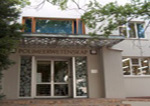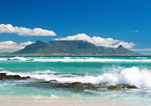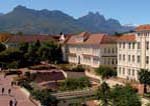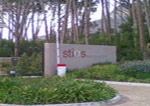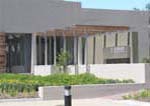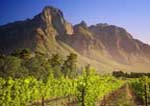 |
|
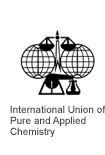 |
Official Language
South Africa has 11 official languages but at the Conference only ENGLISH will be spoken. No simultaneous translation will be provided.
Medical Service
Mediclinic Stellenbosch is a 24-hour emergency centre and is constantly manned by a professional, multidisciplinary team who are trained in life-saving techniques and supported by state-of-the-art technology. A specialist rota enables the doctor on duty to call upon a wide spectrum of specialist advice and support.
Physical address: Cnr Saffraan & Rokewood Avenue, Stellenbosch, Tel: +27 21 861 2000
Personal Safety
For tourists, South Africa is a safe as any other destination in the world. South Africa boasts a vast array of cultures, communities, sites and attractions. Most parts of the country can be safely visited by tourists provided they take basic common-sense precautions (for example not walking alone in deserted areas at night and being circumspect about how much photographic equipment or flashy jewellery you carry).
Malaria
Malaria is found only in the far north-east of the country. Malaria is not much of a risk in the winter months from May to July. Although the incidence of malaria is rare, it would be best to take adequate precautions if you choose to visit these areas. The cheapest, safest and most effective measures against malaria are physical barriers such as a mosquito net, and the use of a good insect repellent. If you decide to take malaria prophylaxis, it is essential that you take the medication according to the directions on the package insert. It is advisable to consult a medical professional before embarking on a course of malaria prophylaxis. Note that expectant mothers should avoid malaria medications.
Food and Water
As a rule, tap water in South Africa is safe to drink as it is treated and is free of harmful micro-organisms. In hotels, restaurants and nightspots, the standards of hygiene and food preparation is top-notch. It is safe to eat fresh fruit and salads and to put as much ice as you like in your drinks.
Road Safety
Our transport infrastructure is excellent and our roads are in good condition.
We have very strict drinking and driving laws - with a maximum allowable alcohol blood content of 0.05%. Translated that means about one glass of wine for the average woman and perhaps 1.5 or two for the average large man. Our speed limits are 120 kmph on the open road, 100kmph on smaller roads and between 60 and 80 kmph in towns.
Driving
All visitors intending to drive are required to obtain an international drivers permit, visitors found driving without a permit will be fined and not permitted to continue on their journey. Visitors will also not be able to rent a car without a valid driver's permit. The wearing of seatbelts is compulsory and strictly enforced by law. Speaking on mobile phones whilst driving is only allowed via a hand-free kit. South Africans drive on the left hand side of the road.
Vaccinations
Visitors who are entering South Africa from a yellow fever zone must have a valid international yellow fever inoculation certificate. Only infants under the age of one year are exempt. Immunisation against cholera and smallpox are not required and no other vaccinations are required when visiting South Africa.
Currency
The rand (sign: R; code: ZAR) is the currency of South Africa. The current exchange rate can be confirmed at: Currency Converter
Guests houses, hotels, restaurants and shops generally may accept international credit cards including Visa, American Express, Diners Club and Master Card.
Clothing & Weather
The seasons in the Southern Hemisphee are directly opposite to those of the Northern Hemisphere. For summer months, lightweight (cottons and linens), short-sleeved clothes are best, although a light jersey/jumper might be needed for the cooler evenings. Warmer clothes are needed
for the winter months. Summery months are from September to April. Daytime summer temperatures range from 25°C to 34°C and in winter, between 14°C and 20°C.
Electricity
- The South African electricity supply is 220/230 volts AC 50 Hz.
- Most plugs are 15 amp 3-prong or 5 amp 2-prong, with round pins. If an adaptor is called for, consider bringing one with you, although they can be purchased locally.
- US-made appliances may need a transformer.
- Most hotel/guest house rooms have 110 volt outlets for electric shavers and appliances.
Time Zone
South Africa operates two hours ahead of Greenwich Mean Time throughout the year, making it an hour ahead of Central European Winter Time, seven hours ahead of Eastern Standard Winter Time and seven hours behind Australian Central Time.
Places of Worship
Stellenbosch offers a variety of options for students from different faith communities. The town has numerous churches, as well as a synagogue (44 Ryneveld Street, Stellenbosch) and mosque (Banghoek Road, Stellenbosch).
Visa Requirements
Should you require a VISA letter for obtaining your visa, please complete the UNESCO/IUPAC Conference 2017 Form for Visa application (below) and e-mail to: aef2@sun.ac.za, whereafter you will receive your VISA letter.
Travelling with a minor
A parent travelling with children, without the other parent, will need a letter of consent from the absent parent. The police must certify the letter of consent.
Should you be travelling to South Africa with a minor please read here about the new travel requirements.
Travel requirements
Please note that, anyone travelling to South Africa must have two consecutive blank pages in their passport, which lie side by side when the passport is open (i.e. left and a right hand page).
Passports must also be valid for at least six months. Passengers travelling to South Africa with passports which do not comply with these requirements, will either be stopped from boarding the aircraft or risk deportation on arrival to South Africa.
Visas
Visas are not required for citizens of most European countries and many other countries. A valid passport is required. A list of countries that currently do not require a visa can be found at the South African Government website
( www.home-affairs.gov.za.index.php/applying-for-a-visa ).
Participants requiring a visa for entry into South Africa are strongly advised to make their applications in their home countries at least six months before their intended date of travel. For more information please contact your nearest embassy or South African Consulate or consult your travel agency. Delegates wishing to travel to South Africa's neighbouring countries and back to South Africa are advised to apply for a multiple-entry visa. Passengers travelling to South Africa are required to have a minimum of two blank pages in their passport to enable the issueing of an entry visa. If there is insufficient space in the passport, entry will be denied and the passenger is likely to be detained pending return to their country of origin. Perhaps this is the time to renew those almost-full passports!


